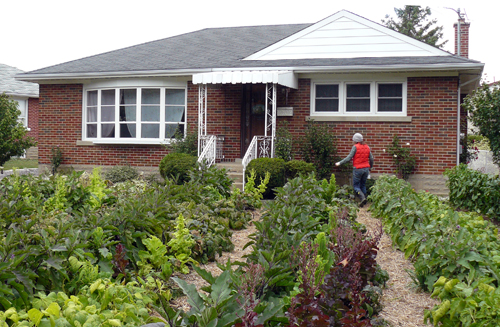
“Everybody’s talking about urban agriculture.” So says Guelph professor Karen Landman, co-organizer of a first-ever conference in Toronto on growing food in cities.
The inaugural Urban Agriculture Summit will take place in Toronto Aug. 15 to 18.
It will be the first large conference on the topic held in Canada, says Landman, an urban agriculture expert in the School of Environmental Design and Rural Development (SEDRD). She expects the event to attract about 600 people worldwide to discuss food production in cities.
Sponsors include U of G’s Ontario Agricultural College, the Centre for Open Learning and Educational Support, the Department of Plant Agriculture and SEDRD.
The event has been organized by Toronto-based Green Roofs for Healthy Cities and FoodShare Toronto. Those groups contacted Landman this year for help in launching the conference. “When we think about agriculture in Canada, we think about the University of Guelph,” says Debbie Field, executive director of FoodShare, a non-profit organization running programs to improve access to affordable, healthy food.
Conference workshops and tours will look at various aspects of urban agriculture, including how to grow food and raise livestock, technological innovation, planning and policy, landscape design, food security and community development.
That diverse mix is no surprise to Landman, who in 2009 toured San Francisco, Vancouver, Milwaukee and other “hotbeds” of urban agriculture programs. “Food is something we all have in common.”
Proponents of growing food in cities point to benefits such as access to food, reduced costs, including transportation and storage, and sustainable production, particularly for certified organic operations. Urban agriculture can even be a tool for community development and for alleviating poverty and improving health, says Landman.
Groups in cities such as Toronto and Ottawa are exploring the use of community gardens and food-share programs to produce more food closer to consumers, including urban poor.
In Guelph, Backyard Bounty is a company that grows produce on residential property for sale to community supported agriculture (CSA) shareholders, farmers’ markets and restaurants.
Promoting urban agriculture within a wider sustainable food system forms part of the City of Guelph’s official plan now under review, says Landman. Her students discussed the topic with city staff revising the plan.
Students in SEDRD’s master of landscape architecture program have also looked at design aspects of urban agriculture, such as using geographic information systems to map likely spots for “farms” in urban areas.
No one is lobbying for full-scale farms within urban boundaries, says Landman, who grew up on a dairy farm in Ontario. Nor do proponents expect that city production will replace North America’s rural farm operations, although she cites one Toronto study that suggested urban agriculture could account for about 10 per cent of the city’s annual vegetable consumption.
Speakers at this month’s Toronto conference will include Will Allen, CEO of Growing Power in Milwaukee; and Ben Flanner, president of the Brooklyn Grange, which promotes farming on New York City rooftops.
Panel speakers will include Erin Nelson, a recent rural studies PhD grad, and Ryan Hayhurst, now working on a doctorate in rural studies, who will discuss food system planning.
Here on campus, the Guelph Centre for Urban Organic Farming is attracting visitors to a small plot at the Arboretum growing fruits and vegetables.
At home, Landman figures she gets about three-quarters of her own food from local growers, including two CSA programs.
Elsewhere, she is discussing ideas for urban farming and community gardens with residents in a low-income neighbourhood in one southern Ontario city. For that project, she’s working with Sridharan Sethuratnam, a geography PhD student and program manager for Guelph-based FarmStart, which supports would-be farmers.
For more information about the Toronto conference, visit http://urbanagsummit.org/.